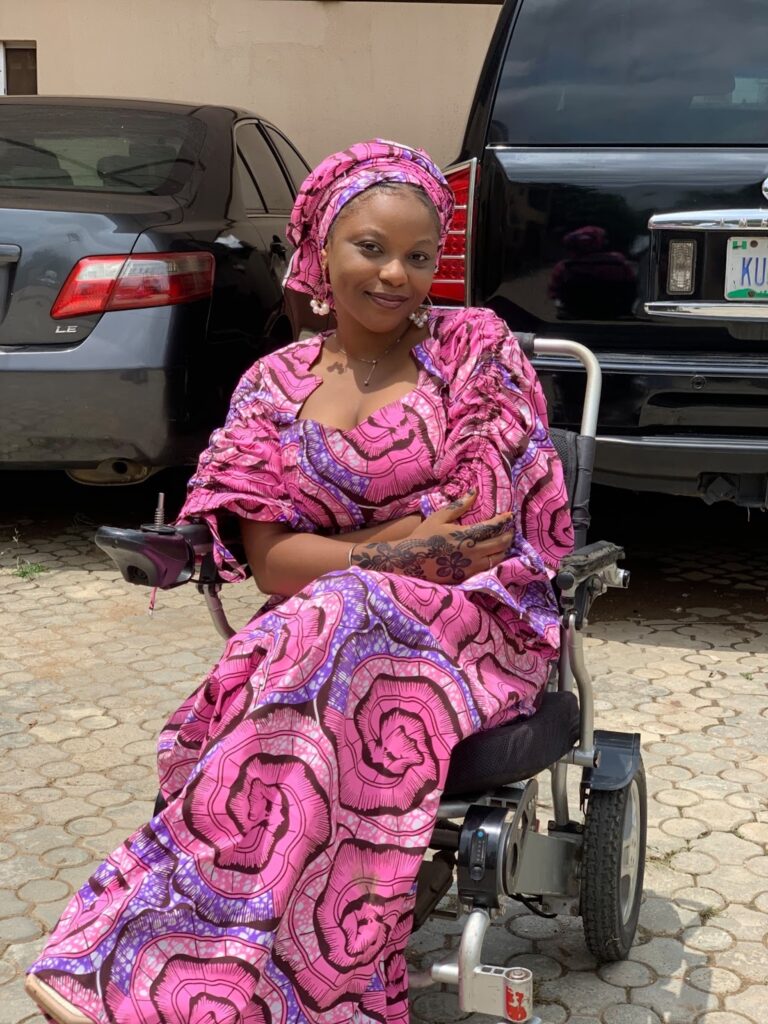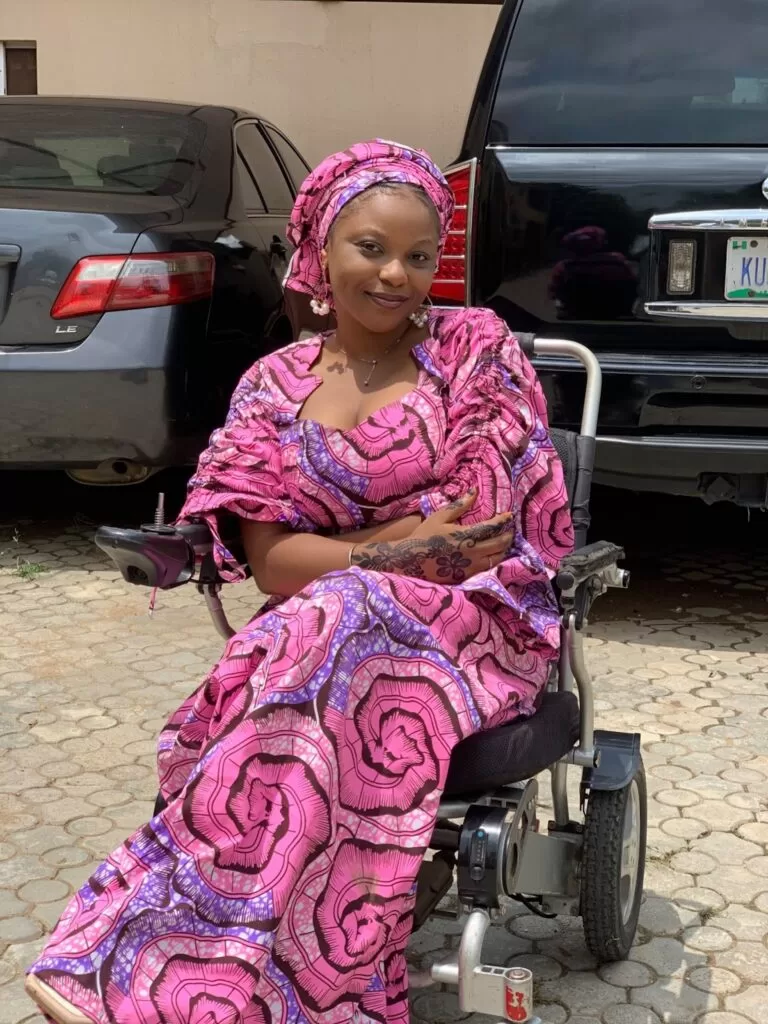Yasmin Bawa, a 24-year-old graduate living with multiple forms of scoliosis, is no stranger to the challenges faced by Persons with Disabilities (PWDs) in Nigeria as her days are usually filled with navigating inaccessible infrastructure, unreliable transportation, and the constant need to adapt.
She said each morning begins with careful planning, considering which routes to take, which buildings to avoid, and which stairs to endure.
“It’s very testing and backbreaking,” she said amid frustration on her wheelchair. “I have to put more thought into going out alone and think about if the infrastructure is accessible because we live in a world where it doesn’t seem like anybody has been taught to build infrastructure with a ramp in most places or elevators. Practically every building is built with stairs including hospitals, public buildings, even your home and you have to learn to work with stairs.”

Yasmin told HumAngle that she often has to crawl on stairs in most public facilities she visits or beg people to carry her like a baby in some instances. She, however, said she faced a lot of discrimination from people who make her feel less of a human in the public.
“Some people perceive people with disabilities negatively and it shows in their faces,” she said as she recounted an awful experience she had during her undergraduate studies in the university.
After navigating the treacherous gravel path along the hall where she took the day’s examination, all she needed was a ride home and so she booked one on her phone. But when the driver arrived and saw Yasmin in a wheelchair, he zoomed off without saying a word. According to her, the driver’s actions spoke louder than any words and it was a haunting testament to the struggles of living with a disability in Nigeria.
Widespread challenges
Yasmin’s experience with the driver encapsulates the realities of nearly 25 million Nigerians who have at least one form of disability, according to World Health Organisation (WHO) estimation.
Though the Discriminations Against Persons with Disabilities (Prohibition) Act signed into law by ex-President Muhammadu Buhari in 2019 provides for the full integration of PWDs into society and prohibits discrimination on the basis of disabilities, persons with disabilities like Yasmin continue to face stigma, discrimination, and barriers to accessing basic social services.
“There’s no amount of crying that would help. So, sometimes I pen down my emotions,” she added.
Speaking with HumAngle, Fatima Aliyu, a beggar on the streets of Abuja, shared a story of resilience and her experience of paralysis after a childhood accident.
“I was born healthy,” she told HumAngle as her eyes were clouded with memories. She explained that she became a wheelchair user at a young age after she fell while fetching water for her grandmother. Without access to medical care, Fatima turned to traditional treatments which could not revive her legs.

Now, the single mother navigates Nigeria’s unforgiving landscape, seeking sustenance for her only son. “There are places I cannot go with my wheelchair. Even when I use a stick, I cannot climb stairs because it is too hard for my legs. It’s either I am carried or I abandon going to places with stairs.”
While Amina Abdullahi, a woman in her late 50s, said she underwent surgery to straighten her legs, her condition was not fully treated, hence, she’s been on a wheelchair for over three decades.
“I used to live in Zamfara but left due to constant raids on our homes by kidnappers. When people run into nearby forest and trees, I can’t run. Sometimes they (kidnappers) come into my home and threaten to shoot me,” she told HumAngle.

“The government doesn’t help us (PWDs),” Amina added amid frustration etched on her face. “I can’t go anywhere on my feet, if i get off this chair, my only other option is to crawl. I can’t climb any stairs, my wheelchair has to be pushed. Everything is a mess honestly.”
Authorities actions and inactions
Before now, HumAngle has done a series of reports on the plight of PWDs in Nigeria. The reports often captured how basic accessibility features like ramps, wide doorways, and elevators are missing in public infrastructures such as schools, hospitals, banks and many other general spaces.
While the Discriminations Against Persons with Disabilities (Prohibition) Law is expected to safeguard people living with disabilities against all forms of discrimination and equalise their opportunities in all aspects of living in the society, the provisions of the laws have largely been unimplemented by Nigerian authorities.
Despite providing for a five-year transitional period within which public buildings, structures or automobiles are to be modified to be accessible to and usable by persons with disabilities, including those in wheelchairs, nothing seems to have changed in public spaces.
Speaking with HumAngle about the legal framework expected to protect persons with disabilities, Hauwa Ibrahim, a lawyer who has in the last nine years treated cases of discrimination against PWDs said laws meant to protect physically challenged Nigerians are not properly implemented.
“There are rights that the discrimination against persons living with disabilities prohibition acts gives to people with disabilities, if you infringe on any of those acts, each one has a fine or punishment depending on which one you’re violating but I don’t think a lot of those laws have been implemented,” she said.
“Even though the law said it needed 5 years to be implemented, I don’t think it’s making an impact on any of the people living with disabilities. We as a people need to have an introspective check on ourselves, know how to accommodate them because they’re no different from us because we could have any of these disabilities. It’s a gradual process to implement it first to yourself, then to your family, your community and the government. Gradually, we can help with implementing this policy.”
Meanwhile, efforts to reach the Executive Secretary of the National Commission for Persons with Disabilities (NCPWD), Ayuba Gufwan, proved abortive as of the time of filing this report as he’s yet to respond to calls and text messages.
Yasmin Bawa, a graduate living with multiple forms of scoliosis, highlights the daily struggles faced by Persons with Disabilities (PWDs) in Nigeria, including dealing with inaccessible infrastructure and discrimination.
Despite the 2019 Discriminations Against Persons with Disabilities Act designed to protect PWDs, Yasmin and others like Fatima Aliyu and Amina Abdullahi continue to face significant barriers and stigma.
Public buildings often lack basic accessibility features such as ramps, forcing people like Yasmin to crawl or seek assistance to navigate stairs.
The law requiring modifications within five years remains largely unimplemented. Legal experts and affected individuals call for better enforcement and societal introspection to accommodate PWDs properly.
Efforts to contact the National Commission for Persons with Disabilities for comments have been unsuccessful.
